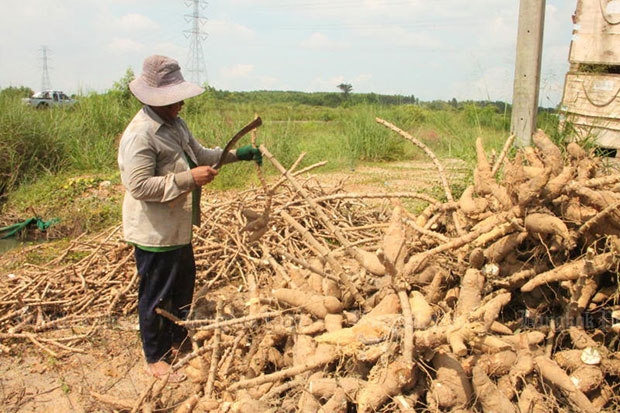
Rising ethanol demand this year, coupled with expected sugar-cane production cuts due to the severe drought, are likely to force ethanol producers to switch to cassava as their feedstock instead of molasses, industry officials say.
Weaker oil prices and the government's policy to spur the use of gasohol E20 and phase out gasohol 91 and gasohol 95 are expected to help increase demand for biofuels to more than 25 million litres a day, according to Energy Ministry data.
That would be well above current demand of 3.7 million litres a day.
Due to the limited amount of sugar cane this year as a result of drought-related production cuts, however, the amount of molasses, a sugar by-product and a raw material for ethanol, is almost certain to drop.
The output of molasses is expected to drop to 4.25 million tonnes, down from around 4.5 million tonnes in the previous year.
"That would mean that some ethanol producers facing molasses shortages would switch to using cassava as a feedstock," said Sirivuth Siamphakdee, honorary president of the Thai Ethanol Manufacturing Association.
He added that with limited sugar-cane plantation areas, the proportion of ethanol produced from molasses and cassava could change from its current ratio of 70:30 to 60:40.
Over the past few years, Thailand had been exporting 200 million litres of ethanol each year to traditional buyers such as the Philippines, Japan and Britain.
Rising demand at home as well as uncompetitive Thai molasses-made ethanol prices compared with the US's corn-made ethanol, however, forced Thailand to halt exports last year.
Thai ethanol producers and exporters have weathered the storm, with rising domestic demand helping offset falling exports.
The switch from molasses to cassava is expected to be a windfall for cassava growers and the tapioca business at a time when the sector has been hit by falling demand from China, the world's biggest tapioca importer.
The Chinese government implemented a policy to support its corn growers, which caused a 250-million-tonne surplus of the crop there, said Suree Yodprajong, the president of the Thai Tapioca Trade Association.
China ordered the entire alcohol-related industry to switch to corn as a feedstock instead of tapioca products, which has sharply cut Thai tapioca exports to China by around 7 million tonnes annually -- equivalent to around 16 million tonnes of cassava.
"Demand from the ethanol sector would be good news for cassava growers, who could see their excess supply absorbed following the sharp drop in demand from China," she said.
Thailand consumes around 42 million tonnes of cassava annually, of which 30-32 million tonnes are home-grown and the remaining 9-10 million tonnes are from Laos and Cambodia.


